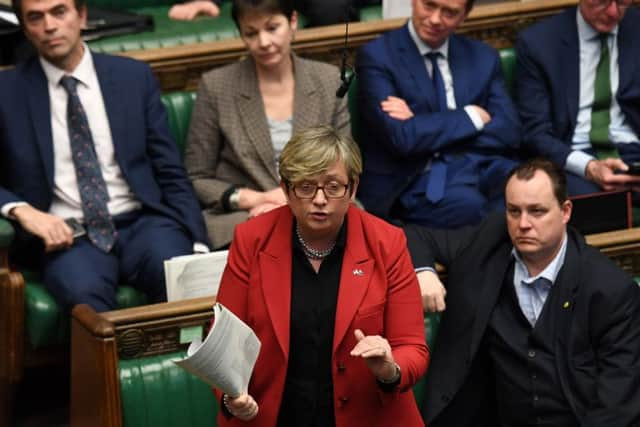MPs vote on alternatives to Theresa May’s EU withdrawal deal
Following a debate disrupted by semi-naked climate change protesters in the public gallery, a highly unusual “indicative votes” procedure was being used in an attempt to establish what outcome might have majority support among MPs.
Proposals for a “Norway-plus” plan for close UK engagement with the EU after Brexit were boosted by support from both Labour and the Scottish National Party.
MPs were also voting on:


Advertisement
Hide AdAdvertisement
Hide Ad- A plan from Europhile Tory grandee Kenneth Clarke for a customs union with the EU after Brexit;
- A demand from Labour backbenchers Peter Kyle and Phil Wilson for a referendum on any Brexit deal passed by Parliament; and
- SNP MP Joanna Cherry’s call for powers for MPs to vote to block a no-deal departure.
No proposal won a majority in last week’s votes, but if a consensus emerges on Monday MPs are expected to take control of the Commons timetable again on Wednesday in the hope of legislating for it.
Despite seeing her deal defeated for a third time last week, the Prime Minister is determined to bring it back to the Commons again in a final roll of the dice before the EU deadline of April 12.
Her hopes were dealt a blow as the Democratic Unionist Party reconfirmed its opposition to a Withdrawal Agreement which was rejected by 230 votes in January, 149 in March and 58 last week.
And Conservative backbencher Richard Drax apologised in Parliament for “making the wrong call” when he switched to back the PM on Friday. The South Dorset MP said Mrs May must resign if she cannot deliver Brexit.
Advertisement
Hide AdAdvertisement
Hide AdMeanwhile, it was confirmed that senior ministers will meet in Cabinet for five hours on Tuesday - the first three hours in a “political” session in the absence of civil servants - to discuss the way ahead, amid speculation about possible resignations, a general election or change of Tory leader.
Mrs May was coming under intense pressure from Brexit-backing ministers and MPs to resist any outcome which would see the UK remain in a customs union, preventing it from striking new trade deals elsewhere in the world.
A letter to the Prime Minister signed by 170 Tory MPs demanded Britain leave by May 22 at the latest “with or without a deal”.
And Treasury minister Liz Truss told the BBC: “It’s not clear to me that going softer is the way to command support... I think that we are well prepared for no deal. I don’t have any fear of no deal.”
The Norway-plus scheme tabled by Conservative MP Nick Boles under the banner Common Market 2.0 was defeated by 94 in the first round of indicative votes last week, when Labour MPs were “encouraged” to support it but the SNP abstained.
Mr Boles said the Labour decision to whip in its favour gave it “a real chance of winning the majority that has eluded the PM”.
It proposes UK membership of the European Free Trade Association (Efta) and European Economic Area (EEA), allowing continued participation in the single market and a “comprehensive customs arrangement” with the EU after Brexit.
If all 35 SNP MPs fall in behind the plan on Monday evening, it could secure a majority unless 7-8 or more Labour MPs rebel against their party’s whip.
Advertisement
Hide AdAdvertisement
Hide AdMr Clarke’s customs union plan was defeated by a margin of just eight in the first round of votes and was being seen as the best hope of MPs looking for a “softer” version of Brexit.
Meanwhile, Government minister Margot James said she was “considering” backing the Kyle/Wilson plan for Mrs May’s Withdrawal Agreement to be subject to a confirmatory second referendum.
And defence minister Tobias Ellwood said MPs appeared to be “coalescing around a customs union” added to the Prime Minister’s deal.
In an interview with the BBC, Tory chief whip Julian Smith said that the parliamentary arithmetic means a “softer type of Brexit” is inevitable.
In an open letter to MPs, the chief executive of Siemens UK urged them to unite around a “customs union compromise” which he said was “essential” to frictionless trade and would save companies billions each year.
Juergen Maier warned that the UK used to be a “beacon for stability”, but is now becoming a “laughing stock”.
But the Prime Minister has set her face firmly against a customs union, warning it runs counter to the Conservatives’ election manifesto.
Conservative MPs have been given a free vote, but Cabinet ministers will be told to abstain.
Advertisement
Hide AdAdvertisement
Hide AdTory Eurosceptic Andrew Bridgen, a prominent critic of Theresa May, said the Prime Minister had “one chance to save the Conservative Party” by backing a no-deal Brexit next week.
He told Channel 4 News: “The Prime Minister has the choice. She has got over half the parliamentary party, the vast majority of our volunteers and members in the country and our supporters supporting a managed no-deal Brexit on April 12 which would end the uncertainty for business and get us out of the European Union.”
Mr Bridgen added: “I don’t have confidence in Mrs May but she has one chance to save the Conservative Party, to save our democracy and get us out of the EU.”